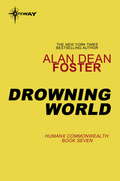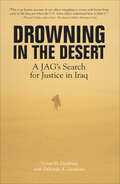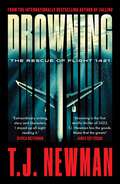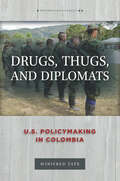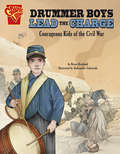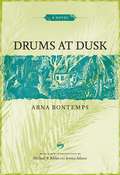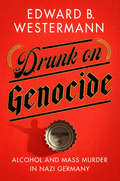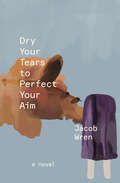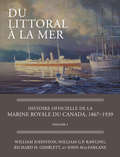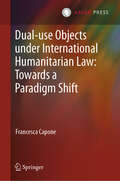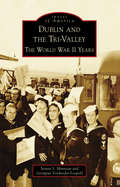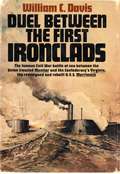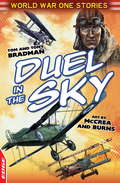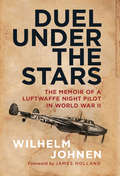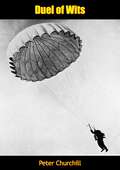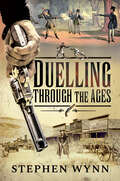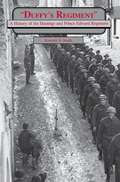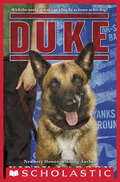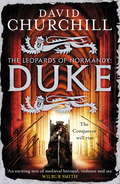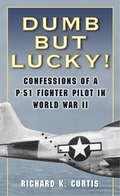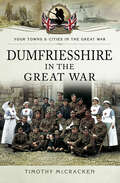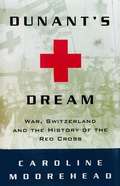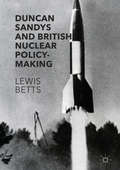- Table View
- List View
Drowning World
by Alan Dean FosterThe Humanx Commonwealth: Book Seven.They call it the Drowning World. It is Fluva, a planet on the fringes of the Commonwealth where it rains torrentially, ceaselessly, and maddeningly for all but one month of the Fluvan year. Chief Administrator Lauren Matthias is fairly new to the position. Her primary goal: keeping Fluva's indigenous species, the warlike Sakuntala, and its immigrant species, the timid but hardworking Deyzara, from annihilating one another. The wettest place on Fluva is Viisiiviisii, an immense, mostly unexplored jungle. Thanks to the endless rains and humid conditions, exotic animals and plants have thrived there, many of them deadly predators. Yet the same evolutionary process responsible for creating toxic creatures has made the jungle a treasure trove of undiscovered botanicals potentially useful in engineering everything from pharmaceuticals to perfumes. A man can get rich there. Or die trying. Bio-prospector Sadrach Hasselemoga has come to the jungle to get rich - if he survives the terrain once his sabotaged ship goes down. When a Sakuntala and a Deyzara are dispatched by Matthias to rescue the unfortunate soul, their ship crashes, too. Now, in order to survive, the three unlikely allies must do something that no one has ever done before: walk out of the Viisiiviisii. Meanwhile, in what passes for civilization, long-simmering tensions between Sakuntala and Deyzara erupt into violence, threatening Matthias's official position of neutrality - and her life. Behind the violence, Matthias detects a mysterious presence, one related to Shadrach's disappearance. But how are the two related? The answer, when it comes, will send shock waves through the entire Commonwealth...and beyond.
Drowning in the Desert: A JAG's Search for Justice in Iraq
by Vivian H. Gembara Deborah A. GembaraSeveral people are waiting to greet Captain Vivian Gembara when she returns home after a year-long tour of duty in Iraq--her grateful fiancŠ and two officers dispatched from headquarters to retrieve "the file." Certainly not the homecoming she expected, but such is life when you are in the business of soldiers behaving badly. As a lawyer for the U.S. Army, Vivian counsels them, investigates them, and when necessary, prosecutes them. When an Iraqi teenagers body is found floating in the Tigris River and U.S. soldiers are believed to have been involved, she knows she has a case on her hands. What she doesn't realize is just how much that case will reveal about the Armys conduct at war.Drowning in the Desert:A JAG's Search for Justice in Iraq is both a legal thriller and a searing account of the savagery that occurs when commanders place "the fight" above all else.
Drowning: the most thrilling blockbuster of the year
by T. J. NewmanFlight attendant turned New York Times bestselling author T. J. Newman - whose first book Falling was an instant international bestseller and the biggest thriller debut of 2021 - returns for her second book, an edge-of-your-seat thriller about a commercial jetliner that crashes into the ocean, and sinks to the bottom with passengers trapped inside, and the extraordinary rescue operation to save them.Six minutes after takeoff, Flight 1421 crashes into the Pacific Ocean. During the evacuation, an engine explodes and the plane is flooded. Those still alive are forced to close the doors—but it&’s too late. The plane sinks to the bottom with twelve passengers trapped inside. More than two hundred feet below the surface, engineer Will Kent and his eleven-year-old daughter Shannon are waist-deep in water and fighting for their lives. Their only chance at survival is an elite rescue team on the surface led by professional diver Chris Kent - Shannon&’s mother and Will&’s soon-to-be ex-wife - who must work together with Will to find a way to save their daughter and rescue the passengers from the sealed airplane, which is now teetering on the edge of an undersea cliff.There&’s not much time. There&’s even less air.With devastating emotional power and heart-stopping suspense, Drowning is an unforgettable thriller about a family&’s desperate fight to save themselves and the people trapped with them - against impossible odds.Praise for Drowning: 'Stunning, emotional, and unforgettable. Drowning reads like Apollo 13 underwater' Don Winslow, New York Times bestselling author of City on Fire and The Border 'Drowning is The Poseidon Adventure meets The Martian. It is another can&’t-put-down, edge-of-your-seat thriller from T. J. Newman, one of our most exciting new authors' Adrian McKinty, New York Times bestselling author of The Chain and The Island 'Drowning is pure adrenaline and all heart. Gripping, relentless, effortlessly assured, T. J. Newman&’s thriller is tense and moving. You&’ll be grabbed from page one as the crew and passengers of a downed airliner fight for survival and rescuers race to reach them. Drowning is an incredible ride - strap in, brace, and remember to breathe' Meg Gardiner, #1 New York Times bestselling author
Drugs, Thugs, and Diplomats: U.S. Policymaking in Colombia
by Winifred TateIn 2000, the U. S. passed a major aid package that was going to help Colombia do it all: cut drug trafficking, defeat leftist guerrillas, support peace, and build democracy. More than 80% of the assistance, however, was military aid, at a time when the Colombian security forces were linked to abusive, drug-trafficking paramilitary forces. Drugs, Thugs, and Diplomats examines the U. S. policymaking process in the design, implementation, and consequences of Plan Colombia, as the aid package came to be known. Winifred Tate explores the rhetoric and practice of foreign policy by the U. S. State Department, the Pentagon, Congress, and the U. S. military Southern Command. Tate's ethnography uncovers how policymakers' utopian visions and emotional entanglements play a profound role in their efforts to orchestrate and impose social transformation abroad. She argues that U. S. officials' zero tolerance for illegal drugs provided the ideological architecture for the subsequent militarization of domestic drug policy abroad. The U. S. also ignored Colombian state complicity with paramilitary brutality, presenting them as evidence of an absent state and the authentic expression of a frustrated middle class. For rural residents of Colombia living under paramilitary dominion, these denials circulated as a form of state terror. Tate's analysis examines how oppositional activists and the policy's targets--civilians and local state officials in southern Colombia--attempted to shape aid design and delivery, revealing the process and effects of human rights policymaking.
Drummer Boys Lead the Charge: Courageous Kids of the Civil War (Courageous Kids)
by Bruce BerglundIn the early 1860s, the United States is torn apart by Civil War. The conflict between the North and the South affects everyone, including many boys who want to join in the fight. Among them are young Edward Black, Lyston and Orion Howe, and Charles Moore. They're too young to fight in combat, but they show their courage by marching to battle as drummer boys. Like any other soldiers in the war, they risk being wounded, captured, or killed in action. But in spite of the risk, these courageous boys bravely face the dangers of war to help fight for their country.
Drums At Dusk
by Arna Bontemps Michael P. Bibler Jessica AdamsA story of love, violence, and race set at the outbreak of the Haitian Revolution in 1791, African American writer Arna Bontemps's Drums at Dusk immerses readers in the opulent and brutal -- yet also very fragile -- society of France's richest colony, Saint Domingue. First published in 1939, this novel explores the complex web of tensions connecting wealthy plantation owners, poor whites, free people of color, and the slaves who stunned the colony and the globe by uniting in a carefully planned uprising. The novel's hero, Diron Desautels, a white Creole born in Saint Domingue who belongs to the French antislavery group Société des Amis des Noirs, attempts to spread his message of "liberty, equality, fraternity" in a world fraught with conflict.
Drunk on Genocide: Alcohol and Mass Murder in Nazi Germany (Battlegrounds: Cornell Studies in Military History)
by Edward B. WestermannIn Drunk on Genocide, Edward B. Westermann reveals how, over the course of the Third Reich, scenes involving alcohol consumption and revelry among the SS and police became a routine part of rituals of humiliation in the camps, ghettos, and killing fields of Eastern Europe. Westermann draws on a vast range of newly unearthed material to explore how alcohol consumption served as a literal and metaphorical lubricant for mass murder. It facilitated "performative masculinity," expressly linked to physical or sexual violence. Such inebriated exhibitions extended from meetings of top Nazi officials to the rank and file, celebrating at the grave sites of their victims. Westermann argues that, contrary to the common misconception of the SS and police as stone-cold killers, they were, in fact, intoxicated with the act of murder itself. Drunk on Genocide highlights the intersections of masculinity, drinking ritual, sexual violence, and mass murder to expose the role of alcohol and celebratory ritual in the Nazi genocide of European Jews. Its surprising and disturbing findings offer a new perspective on the mindset, motivation, and mentality of killers as they prepared for, and participated in, mass extermination.Published in Association with the US Holocaust Memorial Museum.
Dry Your Tears to Perfect Your Aim
by Jacob WrenWhat are the best ways to support political struggles that aren’t your own? What are the fundamental principles of a utopia during war? Can we transcend the societal values we inherit? Dry Your Tears to Perfect Your Aim is a remarkably original, literary page-turner that explores such pressing questions of our time.A depressed writer visits a war zone. He knows it’s a bad idea, but his curiosity and obsession that his tax dollars help to pay for foreign wars draw him there. Amid the fighting, he stumbles into a small strip of land that’s being reimagined as a grassroots, feminist, egalitarian utopia. As he learns about the principles of the collective, he moves between a fragile sense of self and the ethical considerations of writing about what he experiences but cannot truly fathom. Meanwhile, women in his life—from this reimagined society and elsewhere—underscore truths hidden in plain sight. In these pages, real-world politics mingle with profoundly inventive fabulations. This is an anti-war novel unlike any other, an intricate study of our complicity in violent global systems and a celebration of the hope that underpins the resistance against them.
Du littoral à la mer: Histoire officielle de la Marine royale du Canada, 1867–1939
by William Johnston Richard H. Gimblett William G.P. Rawling John MacFarlaneLa création de la Marine royale du Canada (MRC) en 1910 et ses premières années d’existence ont été marquées par un débat politique quant à la nécessité d’un service naval au Canada. Du littoral à la mer, le premier d’une série de trois volumes relatant l’histoire officielle de la MRC, retrace les trois premières décennies de la Marine, de ses débuts comme marine de pacotille établie par le Premier ministre sir Wilfrid Laurier et constituée de deux croiseurs britanniques obsolètes jusqu’ à son entrée dans la Seconde Guerre mondiale, en tant que force composée de six destroyers modernes et de quatre dragueurs de mines. L’histoire de la MRC au cours du conflit de 1939-1945 a déjà été raconté dans la partie 1, Rien de plus noble, et la partie 2, Parmi les puissances navales, du volume II de la série, publié précédemment. Fondé sur des recherches archivistiques approfondies, l’ouvrage Du littoral à la mer relate les âpres débats qui ont finalement mené à l’établissement de la MRC en 1910, son existence précaire après le remplacement soudain du gouvernement de Laurier par celui de Robert Borden un an plus tard, ainsi que les difficultés de la Marine au cours de la Première Guerre mondiale lorsqu’elle a dû défendre les eaux canadiennes avec très peu de ressources. Des conséquences désastreuses de la terrible explosion survenue Halifax en décembre 1917 jusqu’à la campagne menée par les sous-marins allemands au large de la côte Est du Canada en 1918, le volume I examine dans quelle mesure les conseils souvent incohérents qu’Ottawa recevait de l’Amirauté britannique, à Londres, ont compliqué la tâche de la MRC. La dernière section de cet important ouvrage historique bien illustré traite de l’expérience de la MRC pendant l’entre-deux-guerres, alors que le sentiment antiguerre et une dépression économique menaçaient sa survie même.
Dual-use Objects under International Humanitarian Law: Towards a Paradigm Shift
by Francesca CaponeThis book deals with a crucial and yet under-explored topic that has increasingly gained momentum during modern armed conflicts, i.e. dual-use objects under international humanitarian law (IHL). Dual-use objects, such as energy infrastructures, water installations and civilian means of transportation and communication, which could be used also for military purposes, is a term that has entered the IHL jargon but has not attained the status of a legal concept. Dual-use objects are easily identifiable and yet remain difficult to pin down, in particular when it comes to separating them from military objectives and determining the applicable rules to enhance their protection. Although attacks against critical infrastructures are traditionally justified as being part of a legitimate military strategy, experts and, in some instances, governments are uncomfortable with the idea of depriving the civilian population of services and goods essential to its survival. Yet, the sense of discomfort has not led to any significant improvement and &‘dual-use objects&’ remain on the target lists of most belligerents. A number of factors, which this book analyses to explain the rise and rationale behind the current 'mainstream approach' to dual-use objects, contributed to cementing the status quo. The present book, building on these premises, pursues a twofold aim. First, this book seeks to fill a significant gap in the IHL scholarship in light of the limited attention that the topic has received so far. Second, this book aims to challenge the mainstream approach through a rigorous inquiry and the development of a new paradigm. The paradigm shift, which is at the heart of this study, places under the spotlight the civilian function of dual-use objects and reclaim the central role of the individual actors that plan, order and execute attacks against these targets. This book aspires to become an essential tool for academics and practitioners working in the IHL field, but at the same time its readership is expected to include students at all levels that have an interest in the topic and seeks to approach it in an innovative way. Francesca Capone is Associate Professor of International Law at the Institute DIRPOLIS of the Scuola Superiore Sant&’Anna in Pisa, Italy.
Dublin and the Tri-Valley: The World War II Years (Images of America)
by Steven S. Minniear Georgean Vonheeder-LeopoldIn 1941, the Navy sought West Coast locations for bases to ship men, material, and equipment into World War II's Pacific theater. The Dublin and Livermore area offered wide-open spaces with good transportation routes to the San Francisco Bay area. Near Dublin, the Navy built Camp Parks, Camp Shoemaker, and Shoemaker Naval Hospital. Camp Parks prepared Seabees to build and maintain airfields, ports, and hospitals from Guadalcanal to Japan. Hundreds of thousands of other sailors and WAVES came to Camp Shoemaker on their way from basic training to postings on ships, bases, and stations throughout the Pacific. Shoemaker Hospital saw them again when they returned injured or ill. Farther east, the Navy built Livermore Naval Air Station to train thousands to fly.
Duel Between the First Ironclads
by William C. DavisOn March 9, 1862, an epic naval encounter in Hampton Roads, Virginia, changed the face Of warfare on the water for all time, The Monitor met the Virginia (Merrimack) and their story entered the realm of history and legend. Copyright © Libri GmbH. All rights reserved.
Duel In The Sky (EDGE: World War One Short Stories #1)
by Tony BradmanA new German fighter ace is terrorising British planes over the trenches of France. It will take the bravery and sacrifice of a Britsh ace and the courage of a hero to bring him down.This title is published by Franklin Watts EDGE, which produces a range of books to get children reading with confidence. EDGE - for books kids can't put down.
Duel Under the Stars: The Memoir of a Luftwaffe Night Pilot in World War II
by Wilhelm Johnen"The enemy bomber grew larger in my sights and the rear gunner was sprayed by my guns just as he opened fire. The rest was merely a matter of seconds. The bomber fell like a stone out of the sky and exploded on the ground. The nightmare came to an end."In this enthralling memoir, the author recounts his experiences of the war years and traces the story of the ace fighter pilots from the German development of radar to the Battle of Britain.Johnen flew his first operational mission in July 1941, having completed his blind-flying training. In his first couple of years he brought down two enemy planes. The tally went up rapidly once the air war was escalated in spring 1943, when Air Marshal Arthur Harris of the RAF Bomber Command began the campaign dubbed the Battle of the Ruhr.During this phase of the war Johnens successes were achieved against a 710-strong force of bombers. Johnens further successes during Harriss subsequent Berlin offensive led to his promotion as Staffelkapitan (squadron leader) of Nachtjagdgeschwader and a move to Mainz. During a sortie from there, his Bf 110 was hit by return fire and he was forced to land in Switzerland. He and his crew were interned by the authorities. The Germans were deeply worried about leaving a sophisticatedly equipped night fighter and its important air crew in the hands of a foreign government, even if it was a neutral one. After negotiations involving Gring, the prisoners were released.Johnens unit moved to Hungary and by October 1944 his score was standing at 33 aerial kills. His final one came in March the following year, once Johnen had moved back to Germany.
Duel of Wits [1955 US Edition]
by Peter ChurchillContains – “Of Their Own Choice” and “Duel of Wits” by SOE operative Captain Peter Churchill DSO.In Their Own Choice, he describes his initial training at Warnborough Manor, near Guildford, in sabotage, Morse code, use of firearms, bridge demolition, and French military drill; and then to the Scottish Highlands near Mallaig, for map reading, orienteering, weapons and explosives training, close combat, and physical training; and then parachute training at Ringway near Manchester. The final training was at the Finishing School at Beaulieu Abbey in the New Forest where he learnt railway sabotage, inconspicuous behaviour, codes, cover stories, how to build up networks, and how to behave under interrogation. Of 14 people who began the training, Churchill was one of only three who graduated.He was assigned to the French Section in June 1941, and given his French identity card with a false identity. His first mission was to be infiltrated into the French Riviera by submarine in order to inspect three SOE networks in Antibes, Marseille and Lyons, evaluate their strengths weaknesses, assess their needs, and give them instructions....In Duel of Wits Peter Churchill tells the story of his second submarine operation of board H.M. Submarine P42—Unbroken—commanded by Lieutenant-Commander Alastair Mars, D.S.O., D.S.C., and then goes on to describe his experiences as an organiser of Resistance in the south-east of France, where he spent many months as liaison-officer to a large group. This book includes the epic story of how Odette and Arnaud, racing against time, climbed a 6,000 feet snow-covered mountain in order to signal the bomber that was going to drop a parachute on to its summit. It tells of the arming of the first Maquis force and ends with the betrayal and capture of Odette and Michel.
Duelling Through the Ages
by Stephen WynnPutting aside Roman gladiators and gun-slingers of the American Wild West, by the 19th century duelling had become the sole domain of nobility, military officers and gentleman, with rules added to make sure everything was conducted in a fair and professional manner. The word 'honour' became popular, because it was the reason why most men would challenge another to a duel. This book challenges that notion and asks whether it was really about honour at all, or was it more about arrogance or social standing? Over time kings, leaders and governments passed rules, decrees, edicts and laws banning the practice, but still it continued, even when the duellists knew that the punishment for taking part in such an event could be their own death. The last known duel with swords in France took place at a private residence just outside of Paris in 1967 between two politicians, Gaston Deferre and Rene Ribiere. It was ended after Ribiere, who was due to be married the following day, was twice cut on the arm by Gaston. The book also looks at some of the more humorous, unusual and least expected ways people found to conduct their duels, including throwing billiard balls at each other, duelling whilst sat on the backs of elephants, and two men who decided their differences should be settled half a mile up in the sky in hot air balloons. With more efforts to bring about an end to duelling, the upper classes of British society in particular still held on to the idea of being able to defend their honour, which saw many of them turn to pugilism as a way to sate their disputes, however ridiculous they might appear today.
Duffy's Regiment: A History of the Hastings and Prince Edward Regiment
by Kenneth B. SmithThis is the gripping story of how one man’s half-century of service and devotion helped build and develop the Hastings & Prince Edward Regiment; and how that regiment played a vital role in Canada’s efforts during the Second World War. Angus Duffy was Regimental Sergeant-Major during the Second World War; commanding officer from 1958 to 1962, and Honorary Colonel from 1976 to 1981, an da man revered and respected for his tough but humane approach to leadership, and underlying belief that the common foot soldier was more important than the commissioned officer. Although he wasn’t commanding officer during the Second World War, there was little doubt that the Hastings & Prince Edward soldiers felt they were serving in Duffy’s Regiment. Illustrated with a number of captivating war photos, Duffy’s Regiment is a detailed, and often touching look at the impact one man had on his regiment, and the incredible sacrifice of those men.
Duke (Dogs of World War II)
by Kirby LarsonFrom a Newbery Honor author, a boy loans his dog to the US Army during World War II in this “incisive tale of loyalty, patriotism, sacrifice and bravery” (Publishers Weekly).Hanson is determined to do his part to help his family and his country, even if it means giving up his beloved German shepherd, Duke. Hoping to help end the war and bring his dad home faster, Hobie decides to donate Duke to Dogs for Defense, an organization that urges Americans to “loan” their pets to the military to act as sentries, mine sniffers, and patrol dogs. Hobie immediately regrets his decision and tries everything he can to get Duke back, even jeopardizing his friendship with the new boy at school. But when his father is taken prisoner by the Germans, Hobie realizes he must let Duke go and reach deep within himself to be brave. Will Hobie ever see Duke, or his father, again? Will life ever be the same?“Exceptionally well-crafted and emotionally authentic.” —Kirkus Reviews
Duke (Leopards of Normandy 2): An action-packed historical epic of battle, death and dynasty
by David Churchill**From the co-author of the No.1 bestselling Wilbur Smith novel, WAR CRY*The Conqueror will rise...The Leopards of Normandy trilogy continues with DUKE, as William of Normandy inherits his father's title and assumes command of his lands. David Churchill's 'exciting mix of medieval betrayal, violence and sex' (Wilbur Smith) is sure to enthral fans of Bernard Cornwell and Conn Iggulden.Normandy, 1037. Sparks fly from clashing swords as the game of thrones plays out in bloodshed. Of those named guardian to the boy Duke, all seek advantage and power. Most wish the boy dead. Some will go to any lengths to make it happen.Across the sea, the struggle for the English crown has seen Queen Emma's beloved son killed. She has two more sons waiting in the wings but Godwin, Earl of Wessex - kingmaker and arch manipulator - has other plans.As the noble families of Europe murder each other in their lust for power and fortune, the boy stands apart.His name is William. His destiny is to conquer.Don't miss the final instalment of The Leopards of Normandy trilogy, as Duke William prepares to take England by storm in CONQUEROR. What readers are saying about DUKE:'To read a novel linked by actual historic characters and events whilst still maintaining a racy narrative is quite something. A fantastic read''One of the best historical novels I have read. Well written, compelling, action-packed, good characters. This is seriously worth reading!'
Duke (Leopards of Normandy 2): An action-packed historical epic of battle, death and dynasty
by David Churchill**From the co-author of the No.1 bestselling Wilbur Smith novel, WAR CRY*The Conqueror will rise...The Leopards of Normandy trilogy continues with DUKE, as William of Normandy inherits his father's title and assumes command of his lands. David Churchill's 'exciting mix of medieval betrayal, violence and sex' (Wilbur Smith) is sure to enthral fans of Bernard Cornwell and Conn Iggulden.Normandy, 1037. Sparks fly from clashing swords as the game of thrones plays out in bloodshed. Of those named guardian to the boy Duke, all seek advantage and power. Most wish the boy dead. Some will go to any lengths to make it happen.Across the sea, the struggle for the English crown has seen Queen Emma's beloved son killed. She has two more sons waiting in the wings but Godwin, Earl of Wessex - kingmaker and arch manipulator - has other plans.As the noble families of Europe murder each other in their lust for power and fortune, the boy stands apart.His name is William. His destiny is to conquer.Don't miss the final instalment of The Leopards of Normandy trilogy, as Duke William prepares to take England by storm in CONQUEROR. What readers are saying about DUKE:'To read a novel linked by actual historic characters and events whilst still maintaining a racy narrative is quite something. A fantastic read''One of the best historical novels I have read. Well written, compelling, action-packed, good characters. This is seriously worth reading!'
Duke (Leopards of Normandy 2): An action-packed historical epic of battle, death and dynasty
by David Churchill**From the co-author of the No.1 bestselling Wilbur Smith novel, WAR CRY. **The Leopards of Normandy trilogy continues with Duke, as William of Normandy inherits his father's title and assumes command of his lands. This vibrant series by David Churchill will enthrall fans of Bernard Cornwell and Conn Iggulden. 'An exciting mix of medieval betrayal, violence and sex' Wilbur Smith.Normandy, 1037. Sparks fly from clashing swords as the game of thrones plays out in bloodshed. Of those named guardian to the boy Duke, all seek advantage and power. Most wish the boy dead. Some will go to any lengths to make it happen.Across the sea, the struggle for the English crown has seen Queen Emma's beloved son killed. She has two more sons waiting in the wings but Godwin, Earl of Wessex - kingmaker and arch manipulator - has other plans.As the noble families of Europe murder each other in their lust for power and fortune, the boy stands apart. His name is William. His destiny is to conquer.(P)2016 Headline Digital
Dumb but Lucky!
by Richard CurtisSecond lieutenant Dick Curtis arrived in Italy in May 1944-twenty years old and part of a shipment of P-51 Mustang fighter pilots so desperately needed that they were rushed into combat with less than thirty hours of flight time in their new high-performance aircraft. Six of the twelve pilots assigned to the 52nd Fighter Group were shot down in the first two weeks. By his ninth mission, Curtis was the only one still flying. A maverick, he barely escaped court-martial with his high-flying antics. Escorting bombers sent to pound heavily defended oil fields was risky enough, but strafing the enemy supply lines, ports, and airfields was even more dangerous. Curtis may chalk up his success to dumb luck, but these missions took exceptional skill and courage. This hair-raising account captures the air war in all its split-second terror and adrenaline-pumping action. From the Paperback edition.
Dumfriesshire in the Great War (Your Towns & Cities in the Great War)
by Timothy McCrackenIn Dumfriesshire, the most striking change during the Great War was to occur around Gretna. Here the largest cordite factory in the UK was established, work commencing on the factory in 1915, with completion in 1916.Throughout the region the impact of the First World War was felt greatly by the local communities, which were decimated by the losses suffered during the conflict. The huge influx of workers to H.M. Factory Gretna disrupted areas of daily life and caused an increase in crime. The population of Dumfriesshire supported those who directly suffered as a result of the war, in a number of ways, including the production of wound dressings, the provision of auxiliary hospitals and fundraising efforts to provide support to refugees.Thematic chapters, considering aspects such as recruitment, voluntary medical service and commemoration, illustrate experiences of the Dumfriesshire population, shaped by the First World War.The book contributes to wider understanding of the impact of the First World War, particularly in rural areas, and as such will be of relevance to readers with an interest in cultural and social history.
Dunant's Dream: War, Switzerland and the History of the Red Cross
by Caroline MooreheadThe Red Cross was the dream of the Swiss businessman Henri Dunant that grew into the preeminent international humanitarian charity. The story begins in 1859, when almost by chance, Dunant witnessed the butchery and lack of care for injured soldiers during the battle of Solferino. Realizing that, although modern warfare meant more, and worse, wounded, medical treatment for the first time could save significant numbers of them, he began a crusade leading to 137 national societies and 250 million members today. Caroline Moorehead, a popular columnist on human rights for the London Independent, is the first writer to be granted wide access to the Red Cross's closed archives in Geneva. Her resulting book engrossingly recounts the Red Cross's full history and the moral dilemmas it has faced from the two World Wars to the post-Cold War conflicts of Somalia, Chechnya, and Bosnia.
Duncan Sandys and British Nuclear Policy-Making
by Lewis BettsThis book offers new perspectives on British nuclear policy-making at the height of the Cold War, arguing that the decisions taken by the British government during the 1950s and 1960s in pursuit of its nuclear ambitions cannot be properly understood without close reference to Duncan Sandys, and in particular the policy preferences that emerged from his experiences of the Second World War and his efforts leading Britain's campaign against the V-1 and V-2. Immersing himself in this campaign against unmanned weaponry, Sandys came to see ballistic missiles as the only guarantor of nuclear credibility in the post-war world, placing them at the centre of his strategic thinking and developing a sincerely-held and logically-consistent belief system which he carried with him through a succession of ministerial roles, allowing him to exert a previously undocumented level of influence on the nature of Britain's nuclear capabilities and its approach to the Cold War. This book shows the profound influence Sandys' personal belief system had on Britain's attempts to acquire a credible nuclear deterrent.
